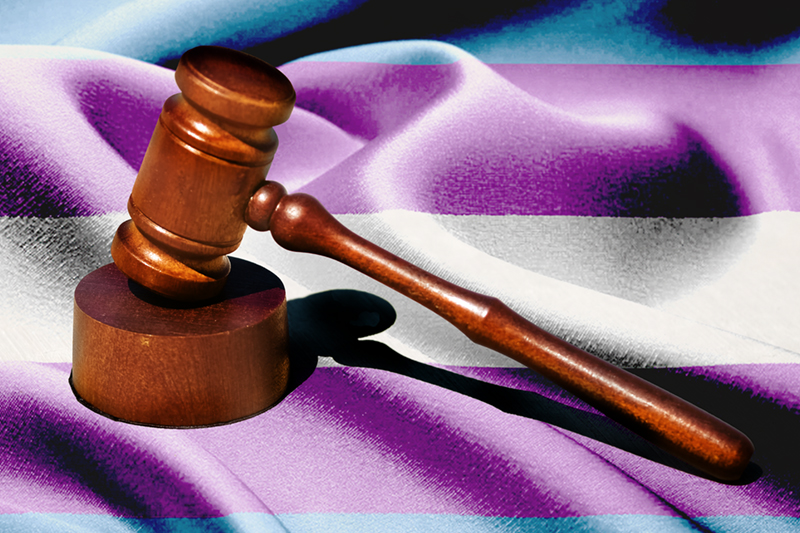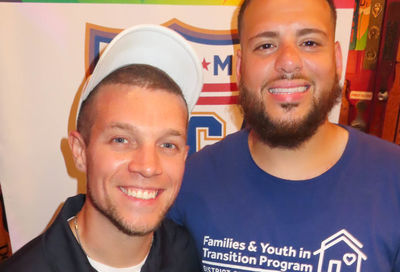6 in 10 LGBTI people in Europe are afraid to hold hands in public, survey says
More than 1 in 4 LGBTI people, and 6 in 10 trans people, say they've been discriminated against in the past year

More than six in 10 LGBTI people in Europe say they regularly avoid holding hands in public due to fear of discrimination, according to a survey conducted last year, the results of which have just been made public.
The survey, conducted by the European Union Agency for Fundamental Human Rights (FRA) from May 27-July 22, 2019, polled more than 140,000 people across the continent to examine attitudes and behaviors of LGBTI people, as well as the frequency with which they experience discrimination or harassment, and the degree of LGBTI acceptance in the societies in which they live.
According to the survey, 53% of LGBTI people in Europe say they are almost never or rarely open about their sexual orientation or gender identity.
An even larger percentage, or 61%, say they always or often avoid holding hands in public due to fear of harassment or discrimination.
One in three LGBTI respondents always or often avoid certain places or locations due to fear of being assaulted, threatened, or harassed due to their sexual orientation or gender identity.
For those aged 15 to 17, 37% of LGBTI people say they are never open about being LGBTI.
“The results show little progress over the past seven years,” FRA director Michael O’Flaherty wrote in the report’s foreword. “Imagine being afraid to hold your loved one’s hand in public, skipping office banter to avoid divulging with whom you share your life, choosing the long way home to side-step potentially hostile ground, or enduring ridicule every time you show your personal identification.”
“In the year 2020, these remain realities for all too many lesbian, gay, bisexual, trans and intersex people across the European Union and beyond,” O’Flaherty continued.
See also: Poland debates law to ban sex education by labeling teachers as gay activists and pedophiles
The study also found that 43% of respondents reported having been discriminated against in the past year — an increase of 6% from a similar FRA survey in 2012.
The increase was even more stark for transgender people, with six in 10 saying they had experienced discrimination over the prior year — up from 43% in 2012.
Discrimination often took various forms, including being denied employment, being refused service at a café, restaurant, bar or night club, difficulty finding LGBTI-friendly medical treatment, being denied access to social services, or having their application for housing rejected.
In recent years, reports of anti-LGBTQ physical attacks have increased in Europe, and several governments across the continent have attempted to block or repeal LGBTQ rights, particularly as far-right or fascist regimes with anti-LGBTQ leaders or platforms have begun gaining power.
The report found that 58% of LGBTQ respondents said they had experienced harassment in the form of offensive or threatening situations at work, on the street, on public transport, in a shop, on the Internet or anywhere else, including offensive or threatening incidents of a sexual nature.
That marks an increase from seven years ago, when only 45% of respondents reported the same types of harassment. Only 10% of all instances of harassment were ever reported, with only 4% of instances reported to police.

Nearly one in 10 LGBTI respondents in Europe said they were physically or sexually attacked in the five year prior to the survey, with more than one in six transgender individuals and one in five intersex individuals reporting they’d been attacked. But only 21% of violent incidents were ever reported to any organization, and even fewer, 14%, were reported to the police.
Of those who did not report physical or sexual violence, one-quarter said they did not report because of fear of homophobic or transphobic reactions by law enforcement.
The rate is even higher for transgender respondents, with one-third saying they failed to report due to concerns over homophobic or transphobic reactions by police.
The survey did note that differences remain among the EU members states. For instance, while 70% of people Ireland, which legalized same-sex marriage in 2015, and Malta, which became the first European country to ban conversion therapy in 2016, said they believed intolerance of LGBTI people had decreased since 2012.
By contrast, 54% of French respondents, and two-thirds of Polish respondents, reported that intolerance has increased over the past seven years.
O’Flaherty told CNN that he worried disparities between LGBTI people and their heterosexual peers might be exacerbated by the COVID-19 pandemic.
“Too many LGBTI people continue to live in the shadows, afraid of being ridiculed, discriminated or even attacked,” he said. “Their job and healthcare difficulties may worsen due to COVID-19. Policymakers should take note and do more to actively promote full respect for rights of LGBTI people.”
Read more:
Gay New York senator slams blood bank for rejecting him due to his sexuality
Capital Pride’s Ryan Bos on his COVID-19 experience: ‘Take everything seriously’
Dan Levy, Janelle Monáe, Billy Porter set for NYC Pride broadcast special
Support Metro Weekly’s Journalism
These are challenging times for news organizations. And yet it’s crucial we stay active and provide vital resources and information to both our local readers and the world. So won’t you please take a moment and consider supporting Metro Weekly with a membership? For as little as $5 a month, you can help ensure Metro Weekly magazine and MetroWeekly.com remain free, viable resources as we provide the best, most diverse, culturally-resonant LGBTQ coverage in both the D.C. region and around the world. Memberships come with exclusive perks and discounts, your own personal digital delivery of each week’s magazine (and an archive), access to our Member's Lounge when it launches this fall, and exclusive members-only items like Metro Weekly Membership Mugs and Tote Bags! Check out all our membership levels here and please join us today!

























You must be logged in to post a comment.